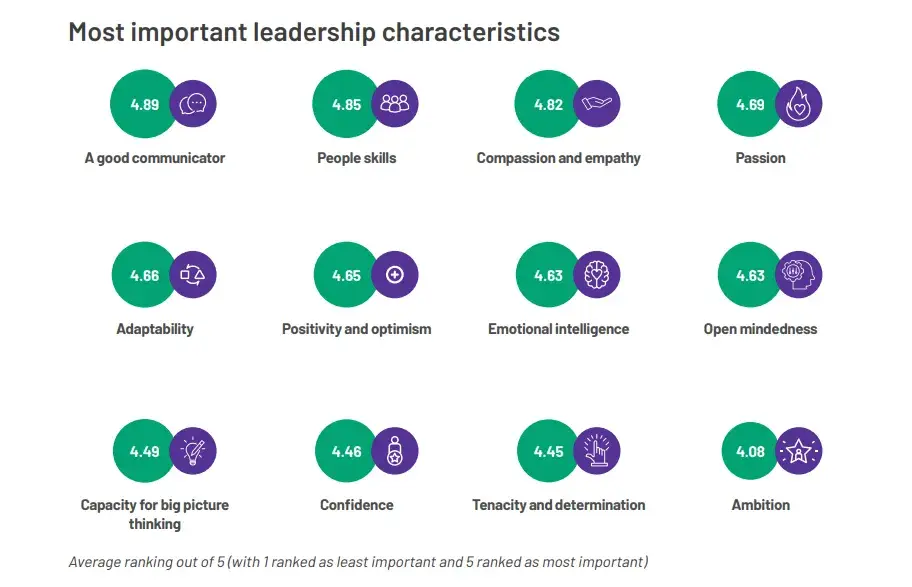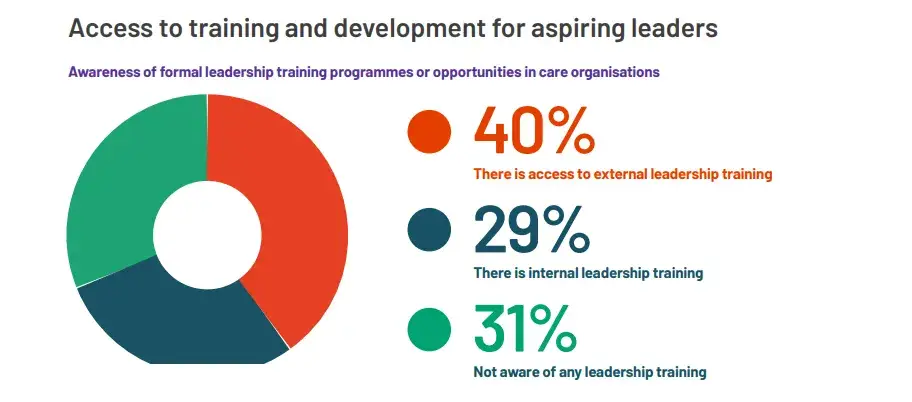
Stepping into a leadership role in care isn’t about telling people what to do – it’s about growing, guiding, and empowering your team to be their best. In this blog, we’re going to show you how you can develop and evolve your leadership skills, taking insight and inspiration from our new Essential Guide to Leadership in Social Care.
Whether you’re just starting out or looking to build on your existing skill set, we’ve pulled together helpful tips, advice, and useful resources you’ll need to lead with confidence and compassion.
Are you ready? Let’s dive in!
Table of Contents
Why are leadership skills important in care?
Employing the right leadership skills in care results in good decision making, being able to guide and empower teams through challenges, and developing trust and respect. These skills are important because they directly influence and impact the quality of care provided and the wellbeing of both service users and care professionals.
What are the essential leadership skills I need?
In our latest Leaders of Tomorrow research report, we spoke to more than 260 care leaders and identified the key qualities that shape a strong leader. Here’s the top five:
- A good communicator: Being a good communicator is essential. Ensuring you and your team are on the same page about your goals, values and direction lends itself to favourable outcomes and an intuitive group connection.
- People skills: Employing and understanding the right mix of skills in your team is key. Leveraging team strengths and identifying areas for growth enables you to build a robust and dynamic group of people with a competitive edge. Building trust and an open line of communication lends itself to achieving good team morale and empowered team members.
- Compassion and empathy: Compassion and empathy are particularly important for leaders in care, given the nature of their working environment. These attributes enable them to understand and respond effectively to the emotional and physical needs of both their clients and care staff.
- Passion: Passion is a driving force in leadership. It inspires teams to strive for excellence and stay committed to providing the best possible care.
- Adaptability: The ability to adapt is key in leadership, especially in the care sector, as it allows leaders to effectively navigate changes and unexpected challenges, ensuring continuity and quality of care.

Most important leadership characteristics rated by care leaders (Leaders of Tomorrow: Research to inform the future of leadership in social care)
Enhancing communication skills in care
Good communication has been highlighted as the most important leadership skill in our research. It’s about ensuring people really understand the messages you’re delivering.
Here are some best practice communication tips:
- Practice active listening: By actively listening to your team – which means really focusing on what they’re saying without interrupting – you can understand their ideas and concerns better, making them feel valued.
- Hold regular team meetings: Holding regular team meetings gives you a chance to share information clearly and directly, and it also lets your team ask questions and give feedback, making everyone feel more involved.
- Body language awareness: Being aware of your body language, like making eye contact and nodding while others speak, can show that you’re engaged and understanding, helping to build trust and respect among your team.
Quick self-assessment activity
Reflect on a recent team meeting or conversation. Did your team clearly understand your message and were they able to give their input comfortably? Think about their responses and body language to gauge how well you communicated and how open the communication flow was.
How do I develop the right skills for effective leadership in care?
Continued professional development and training is key to growing the right skills to become an effective leader in care. Engaging in regular self-evaluation, seeking feedback, and setting personal development goals can significantly enhance your leadership abilities. This is known as self-assessment.

The importance of self-assessment in leadership development
Self-assessment is a fundamental step in becoming a well-rounded and established leader. Reflecting on your strengths and areas for growth, and actively seeking guidance and direction from leadership mentors and peers, are practices that foster improvement and excellence.
Here are some effective ways you can assess your own leadership skills:
- Setting personal goals and reflecting on progress: A care leader can set specific leadership goals (like improving communication or decision-making skills) and regularly reflect on their progress towards these goals. This helps them see where they’re doing well and where they need to grow.
- Seeking feedback from leadership mentors and peers: Aspiring leaders should seek feedback from their leadership circle. This could involve setting up one-to-one meetings, coaching sessions and / or issuing questionnaires to understand how their leadership style can develop to positively support their team.
To learn more about self-assessment, download our free Leadership Self-assessment Checklist.
Self-assessment tip
After making important decisions, a care leader can look back at the outcomes and consequences of those decisions. This helps them understand the impact of their leadership choices on both client care and team dynamics.
Educational pathways and professional development opportunities
According to our most recent social care leadership research, just 29% of carers reported that they had access to formal leadership training at work – a concerning statistic for those looking to progress in their leadership careers.

Awareness of formal leadership training programmes in care organisations (Leaders of Tomorrow: Research to inform the future of leadership in social care)
For aspiring leaders in care without internal training opportunities, it’s important to focus on professional growth and development opportunities outside of your organisation. This could involve enrolling in accredited courses outside your workplace or earning professional qualifications that show you’re skilled in a set of given areas.
Here are some suggestions taken from our Essential guide to leadership in care:
1) Digital Leadership Programme by Skills for Care and The National Care Forum
Enhance your leadership capabilities by participating in this four-day virtual programme designed for registered managers in social care. Develop confidence in integrating digital technology in care delivery.
Learn more: Digital Leadership programme by Skills for Care and The National Care Forum
2) Skills for Care Leadership Training
Skills for Care offers a variety of training courses tailored for leaders in adult social care. These programs are designed to support leadership development at all levels.
Explore more: Skills for Care Leadership Training
3) Leadership Development by The King’s Fund
The King’s Fund provides leadership development programs that support leaders in implementing integrated care systems (ICS). Discover opportunities to enhance your leadership skills.
Find out more: King’s Fund Leadership Development
4) Request a mentorship
Mentorship is crucial for aspiring leaders in the care sector. A mentor can provide guidance, share experience, and offer insights to help you grow in your leadership role.
To support you in securing a mentorship, we have put together a free downloadable Mentorship Request Template which you can use to reach out to potential mentors.

Top 5 training opportunities as rated by leaders in care (Leaders of Tomorrow: Research to inform the future of leadership in social care)
Explore more resources
For even more resources, including podcasts, articles and videos, download our Essential guide to leadership in social care.
What leadership styles are used in social care?
Team leaders in social care lead in different ways. The most successful leaders know what style to employ depending on the challenge at hand. Let’s take a look at some of the most popular leadership styles in social care and the wider world of business:
- Transformational leadership: This is about getting staff excited about a shared goal, encouraging new ideas, and making changes for better care. These leaders push their teams to do more than they think they can.
- Servant leadership: Servant leaders put their team’s growth and happiness first. They focus on what their team needs, so everyone can do their best in caring for service users.
- Situational leadership: This flexible way means changing how you lead based on how ready your team is. For instance, offering more guidance to new staff while giving experienced team members more autonomy.
- Democratic leadership: Here, leaders make choices based on what everyone in the team thinks. It’s all about working together and talking things out.
- Autocratic leadership: Autocratic leaders make choices alone and give clear orders. This works well when you need to act fast, like in an emergency.
- Laisses-Faire leadership: Also called hands-off leading, this style lets your team choose how they work. It’s good when your team is experienced and motivated.
- Coaching leadership: These leaders focus on helping each team member get better and do their best.
- Transactional leadership: This style is about setting clear goals and using rewards or consequences to get there.
Quick self-assessment activity
Reflect on the specific challenges your organisation faces. Consider which leadership style, or combination of styles, would be most effective in overcoming these obstacles and enhancing the quality of care you provide.
Leadership skills examples in action
There’s no one-size-fits-all approach to leadership. In the next three examples, we’ll explore how different leadership styles can be applied in care settings to achieve the best outcomes.
Example 1: The transformational leader
Prisha, a care home manager, faced low morale among her staff. Embracing a transformational leadership style, she inspired her team by encouraging innovation and personal development.
She involved them in decision-making and fostered a culture where each member could contribute ideas for improving care.
By valuing and acting upon their suggestions, Prisha not only boosted morale but also saw a marked improvement in the care provided, leading to higher client satisfaction.


Example 2: The servant leader
Alex, the head of a domiciliary care team, noticed a disconnect between carers and administrative staff. Adopting a servant leadership approach, he prioritised the needs of his team, offering support and resources to enhance collaboration.
By facilitating open communication and ensuring all voices were heard, Alex bridged the gap between the two groups. This led to a more cohesive team environment and a more streamlined care process for clients.
Example 3: The democratic leader
Olivia, a nursing home director, faced a challenging situation with policy changes that affected her staff and residents. Embracing democratic leadership, she involved her entire team in discussions, gathering their opinions and ideas on how to best implement these changes.
Through collaborative decision-making and valuing everyone’s input, Olivia ensured a smooth transition with minimal impact on care quality, fostering a sense of unity and shared responsibility in her team.

Care leadership summary
We’ve now explored what it takes to be a good leader in care and identified the skills that really matter. But keep in mind, being a leader is all about growing and getting better every day. True leadership shows not when things are easy, but how you handle tough and tricky situations.
To build on your leadership skills, download our Essential guide to leadership in care to uncover even more tips and resources on becoming a better leader in care.
FAQs: addressing common questions about leadership in care
Self-assessment will help you understand your strengths and areas for growth as a leader. You can download our leadership self-assessment checklist now.
Look for accredited courses from trusted institutions in the health and social care sector. Skills for Care, the National Care Forum and The King’s Fund each have courses to start learning about leadership.
Yes, leadership styles can and should be adapted based on the team’s needs, the specific care environment, and the unique circumstances of each situation.
Regular, scheduled team meetings alongside open-door policies for informal communication help foster good leadership and team rapport.
Address resistance by involving the team in the change process, communicating the benefits clearly, and providing support and training to ease the transition.




